|
A few weeks ago, there was a story making its way around the internet about a priest who was taking Confessions via Snapchat, a popular app that allows users to send pictures and video with captions which disappear after a few seconds. There has been no concrete confirmation that this priest is a Catholic priest in good standing with the Church, but nevertheless it made me think about the concept of receiving Confession in non-traditional ways. At first glance, the idea of Confession via Snapchat seems like an interesting idea - for priests to meet young people where they are and making an often overlooked Sacrament readily available. But this type of Confession diminishes the Sacramental importance of receiving absolution, and also has canonical implications as well.
For a priest to offer Confession via Snapchat makes the Sacrament invalid, as the Code of Canon Law clearly states that “the proper place to hear Sacramental Confessions is a church or oratory” and that “Confessions are not to be heard outside a Confessional without a just cause” (CIC 964 §1, §3). For a valid Sacrament to take place, the priest and penitent must be physically present in the same place. With the advent of technology, the Code ensures that the Sacraments are still celebrated properly, and that we aren’t receiving absolution by email, telephone, text, or Snapchat! Going to Catholic schools my entire life, the seasons of Lent and Advent were popular times for schools to offer Confession. Typically, we would be shepherded to the Church or Chapel during theology class and given the opportunity to go to Confession if we wanted to. However, one time I received a knock on my door and was told that if I went to Confession, I would receive a cupcake. It seems silly now to basically be bribed by a cupcake, but not one to turn down free cupcakes, I happily obliged. Technically, this also is not a licit celebration of the Sacrament. To go to Confession, the Code also tells us that a person must be “properly disposed” which means not coerced by another person (CIC 962 §1). Although these canonical distinctions might seem like trivial technicalities, they ensure that we enter the Sacrament with an open heart, ready to receive the gift of God’s love and forgiveness with no reservations. For a good part of my life, I was uncomfortable going to Confession, but as I’ve gotten older I’ve learned to become less afraid of this Sacrament. One of the best experiences I had with Confession was in college when priests would come to our residence halls to offer the Sacrament. The residence hall lounge had been turned into a casual Confessional and I had a wonderful discussion with the priest who was there. I realized that going to Confession doesn’t have to be a big scary endeavor and the feeling of grace when I received absolution was incredible. This past Sunday we celebrated Palm Sunday, the beginning of Holy Week. At the end of this week we will celebrate the Easter Triduum. Going to receive the Sacrament of Confession is a wonderful way to prepare yourself spiritually for Holy Week. From Palm Sunday, throughout the Triduum, and on Easter Sunday, we journey with Christ as he sacrifices himself for our sins and rises again. Confession prepares our hearts for the joy of Easter morning, allowing us to begin the season of Easter with a “clean slate.” Haven’t been to Confession in a while? Check out our Lenten Resource Page which includes some great resources on the Sacrament of Penance. Rebecca Ruesch is the Blog Editor for the Catholic Apostolate Center
0 Comments
This week's homily on sin brought up a host of questions during our RCIA class. Are some sins worse than others? Why do we need to confess to a priest? Why does the Pope go to confession so often? Now, truth be told, I was a little off my game that morning. It had been a late night, but my co-catechist and I were doing a fairly good job of breaking open a subject we had not prepared to talk about.
Then, however, came the question, "But are little sins every now and again really a big deal? I mean as long as you are generally a good person, aren't a few sins here or there ok?" Well, I fell flat on my face, and found myself waste deep in relativism. Thankfully my partner saved me from committing the greatest sin of any minister: leading the faithful astray. My big blunder in the vocal vomit of my answer was forgetting Jesus. In my attempt to reassure this person that we are all human, and mistakes and sins are part of that humanity, I had forgotten the all-important challenge of being ever more human, that is, to be ever more like Christ. The Pope goes to confession so often because he has grown close to Christ in his life, and encountering the person of Jesus so intimately, he more easily recognizes the imperfections that you and I tend to miss completely. Confession then is not meant to berate you for the bad things you have done, nor is it meant to embarrass you by telling seemingly trivial things to a strange man in stranger clothes. Rather, Confession is about looking at your relationship to Christ and seeing where you were not Christ-like in your life. After all, all sins are relational because sin never affects me individually. Sin affects those around us: our family, friends, co-workers, and God. When we ask God through the priest to forgive our sins we are asking God to begin the process of healing those strained and broken relationships in our lives. Viewing sins as a relational reality also requires that we not stop our penitence once we leave the confessional. Being more Christ-like means working to mend those relationships we have strained by our selfish and sinful actions. We are challenged to become more selfless, more giving, and more loving as Christ was in his life, death and resurrection. Throughout life we are very much on a journey to know and encounter Jesus ever more closely, and it is in that pilgrimage that we see how we ought to live as women and men of faith. So, to finally answer that person’s question, yes, we are human and we will make mistakes. We will constantly need to return to confession again and again often for the same little things we keep doing. We are on a journey to be more Christ-like, and that encounter challenges us to love and act as he did. The great hope in our life is that we get better at being Christians as we deepen our relationship with Christ. Confession gives us the grace to do this, and to be transformed ever more fully into who we were meant to and will become. Brian Niemiec is the Curriculum Consultant for the Catholic Apostolate Center Editor's Note: This Post was originally published on Catholic How and was reprinted with permission The Annunciation of the Blessed Virgin Mary, which we celebrate tomorrow, is one of my favorite feast days in the Church. Over the years, it has become my favorite solemnity because of two short lines from the Gospel,
Fear not, for nothing will be impossible with God. And then the next line, Behold: I am the handmaid of the Lord, let it be done to me according to Thy Word. (Luke 1: 37-38). These two lines have helped me through the hardest years of my life. In high school, throughout college, and as I am beginning my career, I use these two verses to guide each tough decision I make. To me, the first line is about faith in God no matter what, and the second is about saying “Yes!” and trusting that God’s plan will guide me. Fear not, for nothing will be impossible with God. When we are afraid, our whole presence is affected. We worry about things like the future, bills, jobs, and focus less on the beauty of what is right in front of us. Our minds become full of details that we often have no control over, and our lives can lose sight of our purpose in it all. When we allow Jesus to “take the wheel,” our paths are clearer and calmer, and we can return to living in the present. If something is meant to be, God will see it through for us, no matter what. If something is not meant to be, we have to trust that God has already figured out a better option. With God, we know that anything is possible. Behold: I am the handmaid of the Lord, let it be done to me according to Thy Word. Mary responded to the angel Gabriel with “fiat” or “let it be done,” not knowing what was going to happen, yet saying yes anyway. As a role model for all women and a perfect example of holiness, Mary trusted in God’s Word and showed the world that faith can change the course of history. If we say our “Yes!” to God, whether for a big life change, in a short prayer for a faithful day, or to devote our time to actively serving others, He will provide for us. When we become a willing instrument of His Grace, we die to our selfishness and worry, to become a better apostle of Christ in our communities. We are chosen by God, like Mary was, to live lives in faith. It is a difficult request, to remain unwaveringly trusting for a plan to which we do not see or know. This poem, popularized by Corrie Ten Boom, a Dutch Christian writer who helped Jews during the Holocaust, perfectly sums up my message: My Life is but a weaving between my Lord and me; I cannot choose the colors He worketh steadily. Oft times He weaveth sorrow And I, in foolish pride, Forget He sees the upper, And I the under side. Not til the loom is silent And the shuttles cease to fly, Shall God unroll the canvas And explain the reason why. The dark threads are as needful In the Weaver’s skillful hand, As the threads of gold and silver In the pattern He has planned. He knows, He loves, He cares, Nothing this truth can dim. He gives His very best to those Who leave the choice with Him. Krissy Kirby is a teacher in the Archdiocese of Washington, D.C. 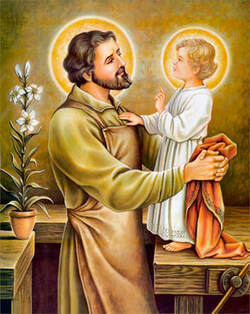 “There is nothing more holy, more eminently perfect, than resignation to the will of God.” ~ St. Vincent de Paul When we hear these words we often think of Mary declaring herself the handmaid of the Lord or Jesus crying out on the cross, “Into your hands Lord, I commend my spirit.” And yet, there is another example of complete sacrifice to God that often slips by us, that of Joseph, the silent and steadfast husband and father, who cared for Mary as the Lord commanded and raised Jesus as his own flesh and blood. “There is nothing more holy, more eminently perfect, than resignation to the will of God.” These are truly words to live by, but not easy words to live by. And yet they give us a powerful image of Joseph, a simple man, a carpenter, a husband, a father, giving himself completely to the Lord. He is a perfect example of someone who wanted to live a simple life, but found more than he could ever imagine when he placed his life in the hands of God. If I had been in Joseph's shoes I would have been afraid, and I am sure that Joseph was afraid, but we know that fear did not guide him. No, “he did as the angel of the Lord had commanded him and took his wife into his home” (Mt 1:24). This image of Joseph is a powerful image. As Saint Pope John Paul II tells us in Redemptoris Custos, Joseph was called by God to be the protector of Mary and the foster-father of Jesus. In some ways we can think of him as the ultimate human protector. He gave up his life and dedicated it to his family, to protect Mary and Jesus so that one day his own son might die a criminal’s death on the cross and save the world. He is a beautiful example of what it means to be a father and a husband, giving all of himself so that his family could live out their own call to serve the Lord. St. Joseph, though often portrayed as a silent figure in the Gospels, remains a beautiful example of fatherhood. Fathers serve in one of the most important and formative roles a child can have. They help us to grow in faith and in love, they teach us the things their fathers taught them, and we look to them for support and guidance, for strength and surety. My own father is one of the greatest men I know. During the last 33 years of marriage he has been a devoted husband and father striving to uphold our faith and me and my three brothers as Catholic gentlemen. He has given his life for his family and God, and I couldn't ask for more. On this feast of St. Joseph the Husband of Mary, it is important for us to remember our own fathers and what they have done for us. It is important to see the sacrifices they have made and how they have guided us to place complete trust in the Lord. As I continue to prepare for marriage this summer I pray and hope that I can live up to the example of St. Joseph and my father, that I can be the husband and father that God is calling me to be. This path is not easy, but I know that if all of us pursuing marriage and those who are already there give ourselves to Christ through the example of St. Joseph that we will live as God has called us to live, in the example of St. Joseph and the Holy Family. This Lenten season I invite you to pursue St. Joseph because in his silence, in his steadfast faith and loyalty to God, and in his devotion and love of his family, he calls us even closer to Christ. Sometimes we need Mary our Mother whose embrace is always loving and warm, like a Mother holding her child. But other times we need the strength of Joseph, a father’s steadfast hand guiding us on the path to Christ, a silent witness to those who have given themselves completely to serving the Lord. Nicholas Shields is a young professional in Washington, D.C.
While studying the New Testament during my sophomore year of Catholic high school, our teacher assigned us a project to make our own Stations of the Cross prayer book. We were to create a modern version of the Stations of the Cross by choosing pictures that reflect each station in contemporary times. I remember wanting to make the Stations of the Cross relevant to me as a high school student and looking for pictures of the Stations as they appear today.
I have always enjoyed history and for this project I found that the Via Dolorosa (Latin for “Way of Grief”) is the street found in the Old City of Jerusalem considered to be the route Jesus walked on the way to his crucifixion. I selected current images of where each station is believed to have taken place. The route is marked by nine of the fourteen Stations of the Cross with the last five Stations found inside the Church of the Holy Sepulcher. Reflecting on the modern photo of each station helped me to create a sort of pilgrimage, creating a visual image of the path Jesus walked to his death. Just as the Via Dolorosa gives us a glimpse of the visual path Jesus walked, we can relate to events and people of the past by associating with the current burdens of our world in order to promote deeper learning and engagement. Just as Jesus was wrongly accused and tortured, so are many around the world through persecution, violence, ignorance and injustice. When Jesus walked with the heavy cross on his shoulders, he carried the heavy burdening sins of others. We, too, can often find ourselves burdened with loads that we created for ourselves and others. We may fall under the heavy loads of work, family, relationships, financial issues or worry. We must learn to graciously accept assistance and thank those who help us like Jesus when he let Simon help him carry the burden of the cross. Likewise, we must remember to help those less fortunate or reaching out to others in unexpected ways. When our egos, dignity and faith have been bruised, we experience the same agony and hurt as Jesus when he fell to the ground a second time. We need to ask God to help us practice the gift of humility. How can we put these reflections into action this Lenten season? Taking just five minutes to pause and reflect on all that we are thankful for can help us understand how we are truly blessed. When I reflect on the Stations of the Cross, I ask God to help me love as I have been loved, to forgive as I have been forgiven and to be in continual awe of God’s marvelous works. During this Lenten journey, I think it’s helpful to find the things in our faith that remind us of God’s love and help us reflect. My pocket Stations of the Cross helps me to do just that. Dana Edwards is a recent graduate of the University of Florida. She currently resides in Tallahassee, Florida where she works as a Digital Strategist, and volunteers as a lector and with communication outreach at her local parish, Good Shepherd Catholic Church. “Do we love the Church as our Mother, who helps us to grow as Christians?
And how do we go beyond ourselves in order to bring Christ to others?” -Pope Francis, General Audience, September 11, 2013 Stop for a moment and re-read again the two questions above. Reflect on how you would answer them. Pope Francis reminds us in his first encyclical, Lumen Fidei, that our growth as a Christian is not an individual act. “It is impossible to believe on our own. Faith is not simply an individual decision which takes place in the depths of the believer’s heart, nor a completely private relationship between the "I" of the believer and the divine "Thou", between an autonomous subject and God. By its very nature, faith is open to the "We" of the Church; it always takes place within her communion” (Lumen Fidei, 39). The Church is the place where we are nurtured by Christ through the community of faith, where we grow in Christ through the sacraments, and where we encounter Christ in those around us, especially in the poor and the suffering. We cannot remain in our comfort within the Church, though. We need to move outward to others and assist them in encountering Christ. Our growth as Christians is a life-long process. There is always more that we can learn, understand, and experience in faith, especially the teachings of our Church. Bringing Christ to others as an apostle or, as Pope Francis emphasizes, a missionary or missionary disciple*, makes a demand on us to know and live the faith. Being catechized does not simply mean knowing the faith, it means witnessing to it in our lives. On-going formation in the faith,being catechized, is a dynamic process that is for life! Our growth in faith is not simply our action alone, however, it is the work of Christ within us and the relationship that we have with him nurtured through prayer. Click here for our resources on catechesis and on prayer Fr. Frank Donio, S.A.C. is Director of the Catholic Apostolate Center. *The term “missionary disciple” is used throughout the “Concluding Document” of the Fifth General Conference of the Latin American and Caribbean Bishops’ Conferences held at the Shrine of Our Lady of Aparecida in Brazil. Cardinal Jorge Bergoglio (now Pope Francis) personally guided the development of the document. Click here to read it. Editor's Note: This post was originally published on September 24, 2013 Every family gathering, I look forward to catching up with my relatives over good food, interesting stories, and lively table talk. Inevitably in my family, the conversation transitions to religion. It’s a heated discussion given that my immediate family is Catholic, whereas the rest (on my mother’s side) is Coptic Orthodox. From then on, our respective faith traditions are more or less pitted against each other as theological matters are analyzed and debated. Of course recognizing that at the core we are Christians united to our Lord through our baptism, we continue to respect each other’s beliefs (cf. Galatians 3:27). We still pray and hope for unification, too, though there are disagreements among us as to how this might occur. In any case, these opportunities to evangelize are enjoyable, as each of us advocates for the faith that has shaped our lives and beings.
“The restoration of unity among all Christians is one of the principal concerns of the Second Vatican Council.” This first sentence of Unitatis Redintegratio, the Decree on Ecumenism is still surprising to many Catholics. It set the stage for the last fifty years of Catholic dialogue and conversation with our Orthodox, Protestant, and Anglican brothers and sisters in the Faith. The Decree gives “Catholic Principles on Ecumenism.” Even Jesus, at the Last Supper, prayed for unity, that His disciples be one (see John 17:21). Ultimately, Christian unity is God’s will and the work of the Holy Spirit rather than solely our own. The Decree nevertheless urges all Catholics to participate in the noble work of Christian unity (#4). This work— our conversation, dialogue, and service with others— calls for complete honesty. We must represent the position of others with truth and fairness and never be dismissive or ignorant of the other traditions. By not pointing fingers and recognizing that any blame for schisms in the Church is shared by all, a heartfelt and meaningful dialogue can be achieved. Ecumenical dialogue, rather than making us less Catholic, makes us more so. By searching within our own faith, we are made aware of the commonalities that we share with our fellow Christians. As for the divergences that we also discover in doing so, it is the Holy Spirit who will help us to overcome them; ecumenical conversation leads us back to prayer: “This change of heart and holiness of life, along with public and private prayer for the unity of Christians, should be regarded as the soul of the whole ecumenical movement, and merits the name ‘spiritual ecumenism’” (#8). To engage others, then, a spirit of humility, honesty, patience, and gentleness is needed. After all, the Church is stronger when its members are open to and inclusive of all traditions. How can the Church, being commissioned to spread the Truth to all, fully honor her call if she does not communicate well with fellow Christians (see Matthew 28:19-20, cf. 1 Corinthians 10-15)? Though we may not agree on every theological point, Christians of all traditions continue to work towards the unification and the strengthening of Christ’s body (see 1 Corinthians 12:12-27). We worship the same Lord, Jesus Christ, Who sacrificed Himself for all without distinction. We answer the same call to evangelize and offer ourselves in loving service to all. The holy sacrifice of the Mass offered and the reception of the sacraments by Christians each day are the same gifts and sources of grace from God. And the ultimate witness of martyrs for their belief in Christ across the world and time further lead us on the road to unity. The Church continues to face uncertain times, just as she always has; Christ, likewise, remains steadfast in His promise to stand by her (see Matthew 16:18, John 16:33). Thomas Wong is an undergraduate at The Catholic University of America in Washington, D.C. We are about two weeks into our Lenten sojourn, and I’m not sure about your experience so far, but I know that it has already been a challenge for me. And that’s good! I wanted this Lent to more closely unite me to the Cross of Christ, not just for these forty days, but beyond this season, and God is answering this prayer in ways that I could never expect. In fact, he is delivering me from my own crosses so that I may know joy through this suffering.
So far, I’ve been able to take away two important lessons from my Lenten journey so far:
Life is hard. Our days are filled with many demands, and sometimes we fail to meet them. People will disappoint us. We may hurt others by our words or actions. We find ourselves exasperated, or at times feeling hopeless. But the one who hopes in the Lord knows that all of these trials of being human bring us to the Cross and teach us sacrificial love. This weekend at mass I was told, “Lent is a school of charity. Life is a school of charity” (Msgr. Andrew Wadsworth). As we navigate these crosses, God is literally stretching our hearts to be open to love – the love of the Cross – so that when we reach heaven, our hearts are like Christ’s sacred heart. And if he stretches our hearts through pain and sorrow, imagine how much God stretches our hearts through hope and joy! Through every trial and every gift we are being molded to become more Christ-like, capable of infinite love. If we could truly fathom this infinite love that God is preparing us for, we would live life on our knees in awe of the Cross. Truly we can say that life is a school of love, a school of charity. The readings today teach us how we can plant our roots to let the Lord more fully direct our lives. We are consistently given the image of a tree whose roots are planted near running water. This tree’s leaves never fade, and in even drought, it still bears fruit. For me, this tree represents my cross, whose confidence must rely solely in the Lord. God can only keep my leaves evergreen if I live off of his waters, God will perform miracles in my life if I let him. Truly letting go of my pride and independence is so hard, yet extremely humbling. It truly takes confidence and prayer. In this school of charity, I’ve learned that even the simplest of prayers can help me submit my cross to God each day: “Multiply my time, Lord,” or “Let me see you where you need me to.” When I say these prayers and trust God to fulfill them, he does. He’s stretching my heart to know his love. He carries my crosses for me. Truly, I am a mere student in this school of charity. As you pray today over your takeaways from Lent so far, I pray that you come to find peace in how the Lord is trying to carry your cross through His school of charity, and that you call upon the grace to let him do so. I pray that you reflect on where your tree is planted and that you want to live by God’s living streams. Ultimately, I pray that you know how loved you are. You are so loved that God is stretching your heart so that you may become more like him. He wants you to know infinite love, who is our Lord Jesus himself. “I pray that you, being rooted and firmly established in love, may be able to comprehend with all the saints what is the length and width, height and depth of God’s love.” – Ephesians 3:17-18 Alyce Anderson is a teacher in Washington, D.C. To celebrate the Catholic Apostolate Center passing 50,000 "likes" on Facebook, Communications and Social Media Intern Andrew Buonopane created a list of 50 Ways to Enjoy your Faith. This is the third post in a five-part series where we'll share the whole list. Check back on the first Tuesday of the month for another installment! #29 - Devotion to St. Joseph St. Joseph is a great role model for all Catholics. Through his devotion to Mary and Jesus St. Joseph teaches us about familial love. The month of March celebrates St. Joseph including on his feast day on March 19th! #28 - Learn what it means to be priest, prophet, and king We often hear about Christ being referred to as priest, prophet, and king, but did you know that these three titles can also apply to other areas of the Church as well? Take some time to research how you can live out the role of priest, prophet, and king in your own life. #27 - Assume the best intentions It’s easy to rush to judgment, but sometimes we can be too hasty. This Lenten season, instead of getting frustrated and making quick judgments, try to see the best in everyone even when it is difficult. #26 - Learn about the New Evangelization The New Evangelization is talked about a lot, but have you taken the time to learn more about it and how you can be a model of the New Evangelization in your own life? Try checking out our New Evangelization Resource page to learn more! #25 - Make a friend! We can often become comfortable in our social lives, sticking with the people we are comfortable with. But making new friends is rewarding (even if it can be difficult to do). Try making a new friend this month and see how new a relationship can enrich your life. #24 – Take a friend to Mass Try inviting someone new to Mass this Sunday. Perhaps they are Catholic and haven’t been to Mass in a while or perhaps they have never been before. #23 - Liturgy of the Hours Have you ever prayed liturgy of the hours before? If not try it! Liturgy of the Hours is a great way to keep prayer a part of your entire day. For more information check out our Prayer and Catechesis resource page! #22 – Rosary The Rosary is a great way to show devotion to the Blessed Mother. If it’s been a while since you last prayed a Rosary, pray one this week! #21 - Faith & Reason Faith and Reason often can often be painted as at odds with each other. But in fact, they are very complementary. If it’s not something you’ve thought about before, check out this article where Pope Francis discusses how faith and reason intersect.
To read the previous installment in this series, click here: Part I | Part II Andrew Buonopane is the Communications and Social Media Intern at the Catholic Apostolate Center |
Details
Archives
July 2024
Categories
All
|
About |
Media |
© COPYRIGHT 2024 | ALL RIGHTS RESERVED


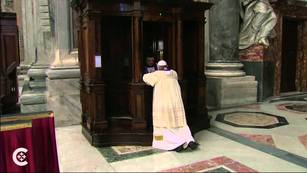



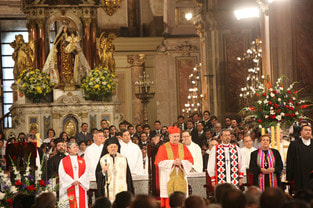


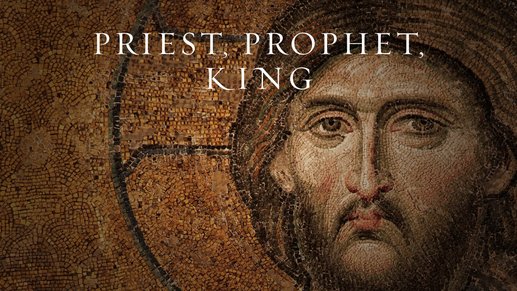



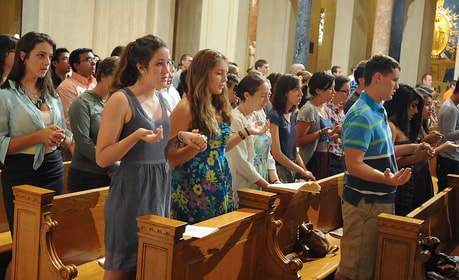



 RSS Feed
RSS Feed